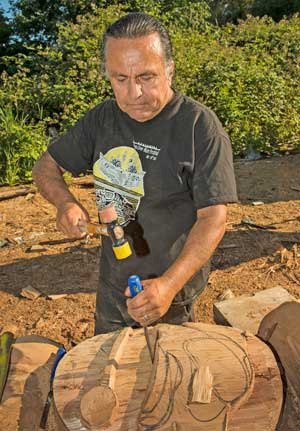Journal staff report
The Lummi Nation is backing up its opposition to the coal terminal with action and outreach.
In support of “unconditional and unequivocal opposition to the proposed Gateway Pacific Terminal” expressed recently to federal, state and local officials, the Lummi Nation will conduct a 1,500 mile “We draw the line” journey from the coal source in Wyoming to the proposed coal terminal at Cherry Point, north of Bellingham.
The tribal delegation on the journey will accompany the Kwel ‘hoy (“We draw the line”) totem pole, now being carved by Lummi master carver Jewell James and his House of Tears carvers. James and his fellow carvers have a history of carving totem poles and placing them at historic and culturally significant sites, including four sites connected with the Sept. 11 terrorist attacks.
The two-week journey will generally follow the coal train path from the Powder River Basin in Montana and Wyoming, connecting with Indian tribes, towns, cities and rural residents along the route to Xwe’chienXen, the name for the 3,500 year-old Lummi village site and burial ground located at the site of the proposed coal port.
 SSA Marine, the lead partner seeking development of the 1,500 acre Cherry Point site, continues to promote the development, touting 1,250 permanent jobs and $140 million in economic activity created by the project. The project is currently undergoing an extensive environmental review by the federal, state and local government agencies, including the U.S. Corps of Engineers and the Washington Department of Ecology as well as the Whatcom County government.
SSA Marine, the lead partner seeking development of the 1,500 acre Cherry Point site, continues to promote the development, touting 1,250 permanent jobs and $140 million in economic activity created by the project. The project is currently undergoing an extensive environmental review by the federal, state and local government agencies, including the U.S. Corps of Engineers and the Washington Department of Ecology as well as the Whatcom County government.
SSA, and its partner Peabody Coal, point to economic benefits and environmental safeguards they will build into the project to assure that the negative environmental effects will be minimized.
Lummi tribal leaders aren’t buying. They point to damage to historical sites already incurred in the area of their historic villages, including a graveyard. They claim major adverse impacts on their “Schelangen,” or “way of life,” which stresses the connectedness of all things and the need for future planning for the next seven generations.
James, who in addition to being a master carver is the director of the Lummi Sovereignty and Treaty Protection Office, and Jay Julius, secretary of the Lummi Nation Council, have assumed leadership roles in publicly opposing the coal port, both locally and nationally, including a recent appearance on the PBS Newshour program.
James and Julius will be conducting a joint program on Orcas Island, on Saturday, Aug. 31, at 5 p.m. at the Episcopal Parish Hall on Main Street, Eastsound, cosponsored by Friends of the San Juans and the Orcas No COALalition. Admission is free, donations to the totem pole journey are accepted.


